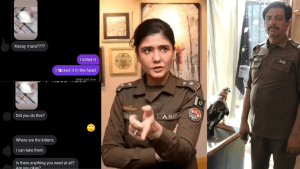It’s no surprise that Pakistan, a country where less than 3 per cent rape cases have lead to conviction of abusers, would still fall far behind in developing a conversation on how the media should approach and discuss issues like harassment and rape. The biggest contributor to how discussions regarding rape are trivialized and treated poorly has to be the media, because a field that is overly dominated by male journalists who refuse to engage with women’s issues in a delicate and sensitive manner, and in turn they influence the masses to act in the same way. Aurat March had recently shed light on how the way male journalists and YouTube bloggers cover the march further contributes to misinformation and completely ignores the basic purpose of the march which is to spread awareness on issues like rape, harassment and the growing inequality of how more women fear accessing public spaces. At the recent Aurat March, members of the movement set up posters of male YouTube bloggers and also mentioned the sexist and rude questions they keep badgering protesters who are attending the march, reminding us that there it is incredibly important the gender bias and internalized misogyny of the media industry is addressed and improved so that more women find safer platforms to discuss their views.
Today, social media users were once more enraged by watching how male reporters once more approached to discuss issues regarding women in an insensitive and brazen manner. A clip circulated the internet from showed actor Nauman Ijaz sitting in a talk show where he openly asked insensitive questions to actress Ayesha Omar regarding her experience with harassment. The actor can be seen asking Ayesha “why did you choose now of all times to speak up about this issue?” which has horrified internet users because it shows how little awareness exists in the media that top professionals are holding important places in the media who have very little education on how to approach survivors of harassment.
If you’re a male journalist who thinks he knows better than us lowly females on how to discuss an issue WE have suffered from, you’re clearly a product of misogyny and in need for an education on how to do your job better. Here are some tips to keep in mind when discussing harassment or rape:
- do not brazenly approach the topic, especially like rape and harassment which can be quite difficult for a survivor to talk about without any preparation first. Discuss this issue with them before hand, and remind them that they are the ones who hold the power during the conversation, not you.
- Allow a woman, or any other person who has researched over the topic to hold this discussion. There are certain ethics to keep in mind when discussing harassment.
- Do not talk over them. This is up to them to speak on a certain topic or not.
- Never ever ask a survivor why they did not speak up before. With how our power structure refuse to create platforms that protect survivors who are financially vulnerable, and also fear from speaking out in case their families were dragged in to the mess, many survivors tend to back out because their abusers are holding powerful positions and can use threats or intimidation to silence them. Understand that a survivor needs assistance from the legal system and other support groups to be assured that them speaking out will not harm them in any way, and they deserve to be treated with empathy rather than distrust.
Reporting of cases regarding harassment and rape has reached a new low in Pakistan because of the boundaries that survivors face since to its our, our society is deeply women-hating and keeps facilitating abusers by giving them powerful positions. Federal Ombudsperson for harassment Kashmala Khan pointed out that more women would rather endure silently than file cases against their abusers because of the horrendous victim blaming culture that refuses to protect women and remind them that they deserve to be treated as equally like men and take over public spaces without fear. In order to implement this change, the media industry needs to address how it has adapted to misogyny and the way it takes little regard with how it approaches women’s issues, and how male reporters who have consistently crossed boundaries and do not follow the ethics and rules of honest journalism should be dealt with harshly so that more women can come forward with their stories.










